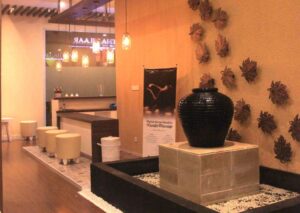The modern spa scene in urban Indonesia is akin to a tranquil oasis nestled within a bustling desert of life. As cities expand and the frenetic pace of everyday existence engulfs the populace, sanctuary spaces have emerged, harmonizing wellness with contemporary lifestyle aspirations. These sanctuaries offer more than mere pampering; they encapsulate a holistic approach to well-being, underpinning the intersection between physical health, psychological resilience, and aesthetic allure.
Contemporary Indonesian spas are redefining traditional modalities, weaving ancestral knowledge into the fabric of modern requirements. They represent a powerful amalgamation of age-old healing practices and the gleam of modern technology. For instance, the use of traditional herbs – adapted from centuries-old Javanese practices – is now harmonized with science-backed therapies that enhance efficacy. Such innovative approaches serve not only to restore balance but to promote overall wellness in a fast-paced society.
Urban settings, characterized by high-stress environments, demand innovative strategies for survival and rejuvenation. In this context, spas have transformed into sanctuaries for the overworked soul. These facilities are tailored meticulously to foster environments laden with sensory stimulation, inducing tranquility while simultaneously awakening the senses. Décor elements such as bamboo, natural stones, and ambient lighting craft a tableau that calms the mind, creating a backdrop against which guests can embark on their wellness journeys.
A pivotal element contributing to the unique allure of the urban Indonesian spa scene is the emphasis on personal rituals. Unlike conventional spa experiences that often adhere to a fixed menu, modern spas in urban Indonesia are embracing customization. This personalized approach allows guests to curate their experiences, selecting treatments that resonate with their individual needs and aspirations. Such a paradigm shift invites clients to transcend passive participation; they become active architects of their wellness narratives.
Moreover, the spas often feature an infusion of cultural elements, rendering each experience distinctively Indonesian. For example, treatments may involve the use of lulur, a traditional body scrub, that not only exfoliates the skin but serves as a conduit for cultural heritage. The ritual encapsulates the rich narratives of Indonesia’s tapestry, allowing clients to connect with the cultural essence while indulging in personal care. Through such experiences, wellness extends beyond the physical – it becomes an exploration of identity and belonging.
With the dawning recognition that mental health is equally as vital as physical well-being, many urban spas have begun offering holistic therapies that emphasize mindfulness and emotional healing. Incorporating practices such as aromatherapy, meditation, and yoga into their services caters to the growing demand for mental wellness solutions. These practices act as therapeutic antidotes to the anxieties that accompany urban life, creating a layered spa experience that nurtures both the body and the psyche.
Moreover, social dynamics play an essential role in shaping the modern spa experience in Indonesia. As community-oriented spaces, many spas are transforming into social hubs where like-minded individuals congregate to promote collective wellness. These spas invite not only individuals seeking solitude but also groups wishing to celebrate shared experiences. Whether it be group yoga sessions, guided meditation circles, or spa parties, these social interactions foster a sense of connection, reinforcing the notion that wellness is not merely an individual pursuit but a communal endeavor.
Technology has found its rightful place within this emerging wellness landscape. Many urban spas are embracing digital innovations to personalize and enhance customer experiences. Applications that allow for easier booking processes, virtual consultations, and personalized wellness assessments are becoming ubiquitous—underscoring the desire for convenience without sacrificing authenticity. This blend of technology with traditional wellness practices demonstrates a profound understanding of modern consumers’ lifestyles, reflecting their need for accessibility and integration.
Furthermore, sustainability has emerged as a hallmark of contemporary urban spas. As societal concerns about the environment intensify, many establishments are prioritizing sustainable practices, utilizing organic products, and sourcing local ingredients to minimize their ecological footprints. This commitment not only appeals to environmentally-conscious consumers but also fortifies the connection between wellness and ethical responsibility. Such an approach reinforces the belief that caring for oneself can harmoniously coexist with caring for the planet.
Ultimately, the modern spa scene in urban Indonesia embodies the intricate dance between wellness and lifestyle. These captivating spaces do not merely provide services; they create profound experiences that resonate on multiple levels. Through the incorporation of ancient traditions, contemporary practices, personalization, and sustainability, urban spas have established themselves as vital destinations in the contemporary cultural milieu. They serve as reminders that within the complexity of modern life, there exists a sanctuary – a place to recharge, reconnect, and rediscover oneself amidst the ceaseless rhythm of the urban landscape.
As individuals navigate the complexities of contemporary existence, these spas offer a reprieve, reminding us that wellness is both a journey and a destination. Thus, embracing the modern spa experience can lead to transformations that transcend the corporeal, fostering a deeper understanding of both self and society within the vibrant tapestry of urban Indonesia.




Leave a Comment